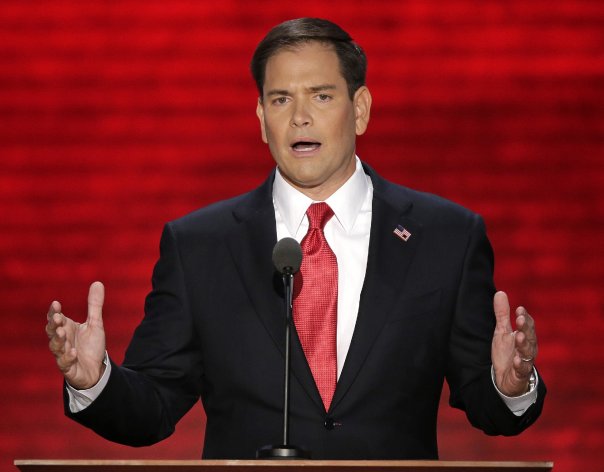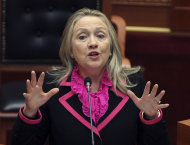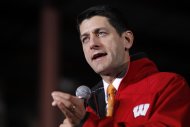DES MOINES, Iowa (AP) — Relieved to see the long, costly 2012 presidential race end? The 2016 campaign is closer than you think.
In some subtle ways, the jockeying to succeed Barack Obama or Mitt Romney already has begun.
Democrats know they'll need a new standard bearer regardless of whether Obama is re-elected, and there are plenty of possibilities — from Hillary Rodham Clinton to New York Gov. Andrew Cuomo. Republicans hope Romney will be crowned the new GOP chief — but a crop of would-be candidates are at the ready in case he loses Tuesday, among them: Florida Sen. Marco Rubio and Wisconsin Rep. Paul Ryan.
Already, rising star Republicans and Democrats have started making the circuit of political party dinners in Iowa, Florida, New Hampshire and South Carolina as they seek to introduce themselves to the early primary voters trusted to cull the field. Others are promoting autobiographies, often a clear indication of national aspirations. And some possible contenders have fired up political action committees to start refining donor lists and spread around contributions, an exercise in building goodwill that can pay off with a future endorsement.
In the coming weeks, tons of names will be floated as possible candidates, a list that will surely be longer than the roster of those who actually make the leap. Many are getting a taste of the presidential campaign trail as they make the rounds far from home as surrogates for this year's nominees, while making important contacts of their own.
For the Democrats, all eyes are on Clinton, the secretary of state who professes no interest but would have a clear advantage if she runs for the nomination that eluded her in 2008. Cuomo, too, is being talked about heavily in Democratic circles.
Maryland's Martin O'Malley appears to be laying groundwork and snagged a plumb gig in September, as the guest of Iowa Sen. Tom Harkin at his annual steak-fry fundraiser in the state that traditionally holds the kick-off caucuses. Other governors who may weigh bids: Colorado's John Hickenlooper, Massachusetts' Deval Patrick and Montana's Brian Schweitzer.
Keep an eye, too, on mayors like Antonio Villaraigosa of Los Angeles, who co-chaired the Democratic convention and headlined the Iowa Democratic Party's annual fall fundraising dinner in Des Moines last month, following a long line of would-be presidential candidates. And another potential: mayor Julian Castro of San Antonio, who delivered the keynote address.
There's also always Joe Biden, the garrulous vice president. He would be almost 74 on Election Day 2016. But he's at least having fun with the prospect, joking in Florida last week with a voter about how the nation's new health law will be popular by then.
"After it's all over, when your insurance rates go down, then you'll vote for me in 2016," he told the man. (Biden said later that it was a decision for another time.)
Should Romney fall short, the list of Republicans who could step up is lengthy.
Ryan, this year's vice presidential nominee, would be toward the front of the pack if he ran. So, presumably, would a slate of governors — Chris Christie of New Jersey, Nikki Haley of South Carolina, Bobby Jindal of Louisiana, John Kasich of Ohio and Scott Walker of Wisconsin. From the Senate, Kentucky Sen. Rand Paul could play for the tea party mantle, with the latter viewed as the heir to father Ron Paul's loyal base of libertarian-minded followers. So could Rubio, a GOP sensation only two years into a Senate term who is headed for Altoona, Iowa, later this month as the featured guest at a birthday celebration for Republican Gov. Terry Branstad.
Former Pennsylvania Rick Santorum, the runner-up to Romney, could give it another go. And former Florida Gov. Jeb Bush hasn't ruled anything out.
Virginia alone could see three former governors as contenders: current Democratic Sen. Mark Warner, former Democratic National Committee Chairman Tim Kaine if he prevails in his Senate race next week and Republican Gov. Bob McDonnell, who is limited by law to one term that expires after next year.
Assuming Romney wins, Iowa-based Republican strategist Eric Woolson said he expects the initial forays by Democrats to begin within a few months of the inaugural.
"It will be next spring that candidates will start to come in and we'll start to see the 'is he/she or isn't he/she running for president? They must be, otherwise they wouldn't be in Iowa' stories," Woolson said.
Iowan Jackie Norris, a former Obama campaign adviser, sees it as "a wide open year ripe with opportunities for veteran and newcomers alike. After two successive terms it's the party's opportunity to create the post-Obama view of the future. "
Part of the exercise for would-be candidates is figuring out how to slip into a presidential proving ground, make a solid impression and mask any White House ambitions by tell anyone who asks that a campaign is a distant proposition. Part of the calculation is about how to afford it all in a campaign finance system stripped of many regulations by the courts.
Part of the challenge: introducing themselves to voters likely not ready to turn to the next campaign.
___
Bakst reported from Richmond, Va. Associated Press writer Matthew Daly in Washington contributed to this report.






No comments:
Post a Comment